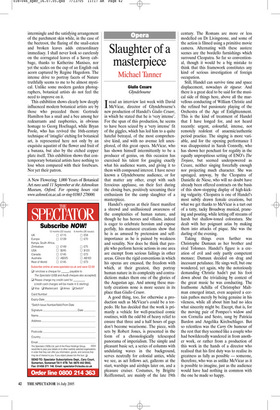Opera
Slaughter of a masterpiece
Michael Tanner
Giulio Cesare Glyndebourne Iread an interview last week with David McVicar, director of Glyndebourne’s new production of Handel’s Giulio Cesare, in which he stated that he is ‘very intense’. For the span of this production, he seems to have been seized by a ‘very intense’ fit of the giggles, which has led him to a quite hateful betrayal, of the most comprehensive kind, and with no avenue left unexplored, of this great opera. McVicar, who has shown himself intermittently to be a producer of genius, on this occasion has exercised his talent for gauging exactly what his audience wants, and giving it to them with compound interest. I have never known a Glyndebourne audience, or for that matter any other, erupt with such ferocious applause, on their feet during the closing bars, positively screaming their enthusiasm for the camp slaughter of a masterpiece.
Handel’s operas at their finest manifest a shrewd and unillusioned awareness of the complexities of human nature, and though he has heroes and villains, indeed is eager to celebrate heroism and expose perfidy, his maturest creations show that he is as amused by pretension and selfimportance as he is pained by weakness and venality. Nor does he think that people who perform heroic actions in one area are exempt from serious failings in other areas. Given the rigid conventions in which his operas are encased, the freedom with which, at their greatest, they portray human nature in its complexity and contradictions makes them one of the glories of the Augustan age. And among these masterly creations none is more secure in its place than Giulio Cesare.
A good thing, too, for otherwise a production such as McVicar’s could be a torpedo. He has decided that the work is primarily a vehicle for well-practised comic routines, with the odd bit of heavy relief to ensure that three and a half hours of gags don’t become wearisome. The piece, with sets by Robert Jones, is presented in the form of a chronologically telescoped panorama of imperialism. The simple and pleasant basic set, a series of columns with undulating waves in the background, serves neutrally for colonial antics, while we see, as act follows act, galleons at the start, warships and airships later on, and a pleasure cruiser. Costumes, by Brigitte Reiffenstuel, are mainly of the late 19th century. The Romans are more or less modelled on Dr Livingstone, and some of the action is filmed using a primitive movie camera. Alternating with these austere scenes are the bordello furnishings which surround Cleopatra. So far so conventional, though it would be a big mistake to think that this framework constitutes any kind of serious investigation of foreign occupation.
Still, Handel can survive time and space displacement, nowadays de rigueur. And there is a great deal to be said for the musical side of things here, above all the marvellous conducting of William Christie and the refined but passionate playing of the Orchestra of the Age of Enlightenment. This is the kind of treatment of Handel that I have longed for, and not heard recently: urgent, colourful, intense, not remotely redolent of anaemic/authentic period practice. The singing is more variable, and for the opening performance I was disappointed in Sarah Connolly, who has shown her penchant for regality in the equally unpropitious setting of ENO’s The Trojans, but seemed underpowered as Cesare, neither singing forcefully enough nor projecting much character. She was upstaged, anyway, by the Cleopatra of Danielle de Niese, who will no doubt have already been offered contracts on the basis of this show-stopping display of high-kicking vulgarity. Cleopatra is one of Handel’s most subtly drawn female creations, but what we get thanks to McVicar is a tart out of a tatty, tacky Broadway musical, prancing and pouting, while letting off streams of harsh but shallow-toned coloratura. She dealt with her poignant arias by making them into attacks of pique. She was the darling of the evening.
Taking things even further was Christophe Dumaux as her brother and rival Tolomeo. Handel’s figure is a creation of evil and only partly competent menace; Dumaux decided on drag and incessant petulance. He sings well, but one wondered, yet again, why the notoriously demanding Christie hadn’t put his foot down about the trivialising by context of the great music he was conducting. The loathsome Achilla of Christopher Maltman emerged intact, even acquired a certain pathos merely by being genuine in his vileness, while all about him had no idea what sincerity might be. Except, that is, for the moving pair of Pompeo’s widow and son Cornelia and Sesto, sung by Patricia Bardon and Angelika Kirchschlager. But so relentless was the Carry On humour of the rest that they seemed like a couple who had bewilderedly wandered in from another work, or rather from a production of this work in the hands of a director who realised that his first duty was to realise its greatness as fully as possible — someone, therefore, who was as unlike McVicar as it is possible to imagine, just as the audience would have had nothing in common with the one he made so happy.


























































 Previous page
Previous page